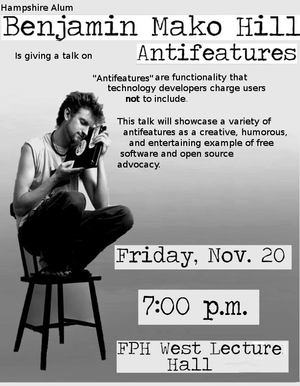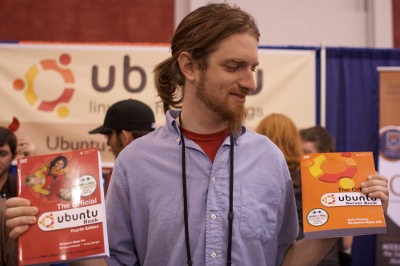I wrote this for the FSF’s annual membership drive where it was originally published. I am reposting it here.
At its core, I think of free software as about the ability of computer users to take control of their technology. Insofar as our software defines our experience of the world and each other, software freedom is an important part of what allows us to determine the way we live, work, and communicate.
Free software is not really about software in this fundamental sense; it’s about bringing freedom to users through software.
In free software’s incredible success over the last two decades, many people have lost sight of this simple fact. We have created an incredible array of applications, libraries, and tools. We have created vibrant development and support communities. We have created new development methodologies, powerful copyleft licenses, and massive collaborative projects. But these are all how we give users freedom. They are not freedom itself. They are not what we were trying to achieve. They are our instruments, not our goal.
This distinction becomes central in a world where technology is in flux. Indeed, we live in such a world. We can see signs of this in how, as most users’ primary computers become mobile phones and new types of network services make up most of many users’ interactions with computers, the free software movement’s old applications, communities, development methodologies, and licenses can become ill-suited to, or ineffective at, protecting user freedoms.
And indeed, in the next few years, bringing freedom to computer users will need to involve new software and new forms of advocacy. It will need to involve new licenses and new techniques for their enforcement. It will need to involve new forms of collaboration and organization. If the free software movement is to succeed, it must stay focused on computer users’ freedom — on the question of why we do what we do — and then work creatively on how to best respect and protect the freedom we are working toward. If we are overly focused on how we’ve done things in the past, we may lose sight of the most fundamental goal of supporting users’ control over their technology in general.
There are many organizations that support the how of today’s free software in various ways — they are law firms and companies and nonprofit organizations supporting various free software projects.
The Free Software Foundation is, by far, the most important organization focused on why — on the underlying principle of software freedom. As such, it plays an essential role in keeping our broader community focused on the key issues, threats, and challenges that will affect the success of every free software project, and every computer user, in the present and in the future. In this period of rapid change in computer technology, its role is more vital than ever. The consequence of any failure is more dire.
Here are some of the ways that I will be encouraging the FSF to serve the free software movement in the coming year:
Mobile Phones
In a short essay I wrote earlier this year, I pointed out that there are now billions of mobile phones and that, although these phones are increasingly powerful computers, they represent one of the most locked-down, proprietary, and “unfree” technologies in wide use. The implications of this fact for users’ control over their technology are dire. Although some widely used phones make extensive use of free software, most “free” phones are locked down and Tivoized and their users remain fettered, divided, and helpless.
We must raise awareness of free software issues among users of phones, communicate to users that phones are powerful general purpose computers, and explain that control over these devices has critical implications for individual autonomy in the future. Toward this end, the FSF staff will launch an advocacy campaign around mobile phones and software freedom in the coming year.
Network Services
As network services — like those built by Facebook, Google, and others — have continued to grow both in scope and penetration over the last year, the importance of a meaningful free software responses grows as well. The launch of products like Google’s network-centric ChromeOS offers one glimpse of what a future computing platform may look like. The implications for user freedom, and for the effectiveness of traditional free software approaches, are frightening. The fact that many network services are built using free software does not make the effect of these services on users’ autonomy and freedom any less catastrophic.
In the next year, the FSF is planning to release the first of what I hope will be several statements on software freedom and network services. Building off the work of the FSF-supported group Autonomous, the Foundation will help provide guidelines for those implementing network services, for users deciding whether to use services, and for developers trying to build services that go further to respect their users’ freedom.
Reaching beyond our traditional communities
Successfully fighting for user freedom is going to mean successfully reaching out to users outside the FSF’s historical “base”. The FSF continues to do so with its Defective By Design anti-DRM campaign and its End Software Patents work. In the last year, the FSF has also reached out to younger users through its “GNU Generation” campaign run by and for high school students. Additionally, the FSF convened a summit this year on women in free software. The FSF plans to build on these successes in the coming year and to expand similar outreach projects.
Of course, fighting for and promoting software freedom is more work than today’s FSF has the resources to accomplish. Each of my three points above represents an ambitious undertaking, and yet just a portion of the items on the plate of the FSF’s small but dedicated staff. Even just continuing its existing projects will require that the FSF adds hundreds of new members by the end of this period. Your membership and donations help make goals like this possible.
A strong free software movement focused on the principled issues of software freedom — and a strong FSF in particular — will determine what freedoms the next generation of computer users will enjoy. At stake is no less than that next generation’s autonomy.
I know that this is not the first fundraising appeal you’ve read this season and I know that the weakened economy makes giving difficult for many. I understand that the cost of a membership or donation may be less easy to afford this year. But we also cannot afford a weakened FSF at this important point of technological transition.
If you are not an FSF associate member, now is the time to become one. If you’ve read my appeal the last two years and decided to wait, now is the time to take the plunge. Membership is $120 per year ($60 for students) and payable monthly. If you are already a member, please join me in giving generously through a tax-deductible donation, or encourage a friend to sign up. The FSF is a small, humble organization of passionate individuals working tirelessly for our software freedom. I’ve seen firsthand that even small gifts
make a difference.

